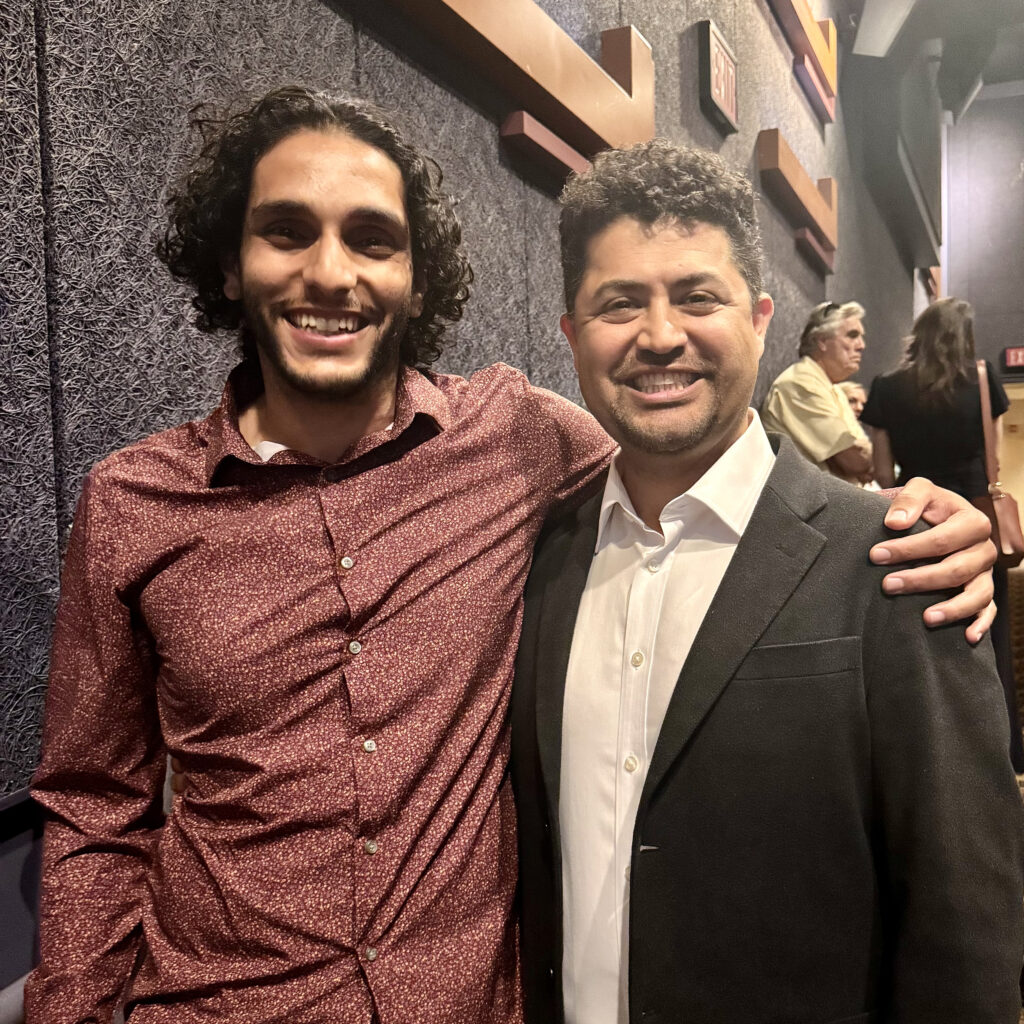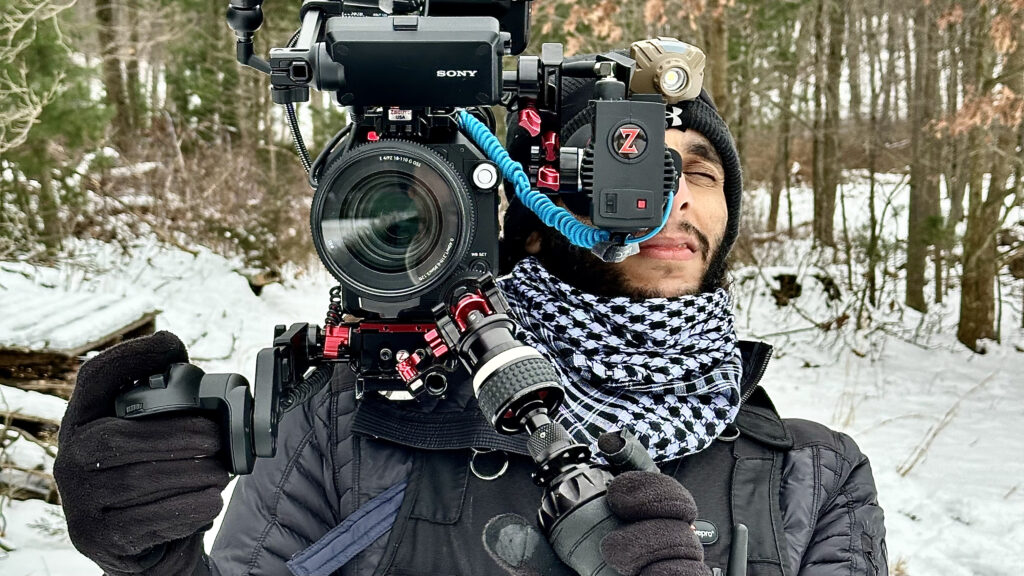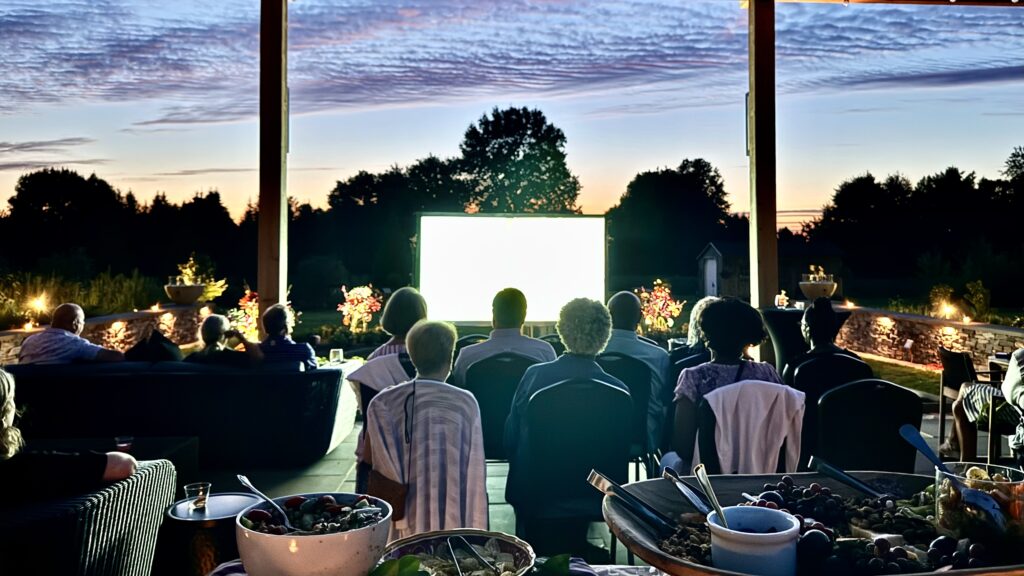From the Nakba to Now: Amplifying Palestinian Voices
At Reel Nation Media, our commitment to telling the stories of those impacted by the global family displacement crisis has been a focus of our work. In 2019, we created “The Pursuit of Refuge,” a documentary that followed a Syrian refugee family’s journey in Allentown, Pennsylvania, as they rebuilt their lives after escaping the horrors of war. This film was a continuation of our commitment to telling stories of resilience and survival in the face of displacement, a theme we first explored in our 2012 narrative short, “Little Big Hero.“ Set against the harrowing backdrop of Gaza during the 2009 conflict, “Little Big Hero“ tells the gripping tale of 11-year-old Amir, who must navigate through a bombed hospital to save his father’s life. Whether in documentary or narrative formats, these stories underscore our mission to amplify voices that are often silenced and humanize the global displacement crisis.
The Pursuit of Refuge is available to watch on the Reel Nation Media YouTube Channel
As we continue to explore this critical issue, we are excited to share a director’s statement from our film director, Abdullah Abu-Mahfouz. This statement is part of our ongoing effort to address the displacement crisis through a new slate of documentary and narrative films. As a first-generation Palestinian American, Abdullah’s connection to the subject adds a profound layer of authenticity and urgency to our mission. We invite our patrons and supporters to read his full statement, which outlines the intention and purpose behind our upcoming films that inspire empathy, healing, and meaningful change in the world. Together, we can help bring these vital stories to a global audience.
Abdullah Abu-Mahfouz’s Director’s Statment
Nationality typically refers to the legal bond between a person and a state, encompassing citizenship, legal rights, and a sense of belonging to a specific nation. However, for me, a first-generation Palestinian American, nationality is distinct from the concept of home. It transcends governments and borders, anchoring itself instead in the values we choose to uphold and the relationships we nurture. Home, for me, is the freedom to live by my principles, whether I find that in the company of loved ones or in the places that have shaped my identity.
A soul-searching conversation with Baktash Ahadi, a film colleague, ignited my desire to create my next film about the people of Palestine. Our artistic values resonated deeply, and Baktash’s insistence on the urgency of amplifying the voices of those suffering in Palestine struck a chord made taut with months of watching events unfold from the sidelines. Ahadi’s unwavering belief in the importance of telling stories that would leave a legacy of justice and empathy gave focused direction to the sense of responsibility within me. I realized that now is the time to leverage my unique position and freedoms as an American filmmaker of Palestinian descent to humanize the Palestinians and bring their stories to a global audience. I left the conversation with Baktash committed to making a film transcending national identity, focusing instead on justice, dignity, and the transformative power of empathy.

Abdullah Abu-Mahfouz and Baktash Ahadi Meet at the 2024 DC Docs Film Festival
My Connection to Palestine
My grandfather on my father’s side, Abdullah, fled Palestine as a child during the Nakba in 1948. The fear and uncertainty he must have felt as he crossed into Jordan, leaving behind his home in Bir al Saba (now Beersheba), are emotions I can only imagine. Though they later moved to Kuwait, Palestine remained in their hearts, a homeland they never returned to but always carried with them. My father, Issam, continued this journey of displacement, moving to the United States to pursue a master’s degree shortly before the Iraqi invasion of Kuwait—a conflict that once again turned his family into refugees.
On my mother’s side, the story mirrors that of my father’s. My maternal grandfather was only two years old when his family was displaced from Haifa during the Nakba. They fled to Lebanon, where he grew up in refugee camps. My mother, Mariam, was born in Saida, Lebanon, but her life was marked by further displacement when Israel invaded Lebanon in 1982. At just 16, she lost her mother to breast cancer and became the caretaker of her eight siblings. Their lives were transformed when my grandfather, Muhammad, married a Hispanic-American woman, leading my mother and her siblings to gain U.S. visas. Her childhood, marked by bombings and her oldest brother’s involvement as a child soldier, was one of relentless hardship.
These interminable stories of the past are interwoven into my identity as the nationality borne on my passport. These experiences of past lives drive my passion to tell the stories of those still facing displacement and suffering today.
Exploring My Heritage
Reflecting on my family’s history, I am confronted with the gaps in my understanding of my heritage. This realization brings with it a deep sense of shame and guilt for not being more connected to my roots—roots that enabled me to live the privileged life I have today. In the absence of the tangible roots which were destroyed, ancestral birth documents, and bulldozed villages, I feel all the more compelled to explore these emotions, which are the intangible roots born of generational trauma, the pain of displacement, and the struggles my parents endured as they navigated their own identities. My mother often spoke of the disdain Palestinians faced in Lebanon and how she felt pressured to identify as Lebanese to escape prejudice. Yet, in our family, there was always a fierce pride in our Palestinian identity—a pride that surfaced during significant events like the Oslo Accords, the Second Intifada, or the Gaza Wars, when my parents would passionately decry Zionism, reminding us that Palestine is our true home.
I was born in Cleveland, Ohio, in 1994. Although I initially spoke Arabic, I quickly lost the language as I focused on English. This loss has always been a source of embarrassment, particularly when speaking with my paternal grandparents, who knew little English. My limited visits to Jordan as a child deepened this sense of alienation, and today, I struggle to speak even a sentence in Arabic—a fact that has always made me feel disconnected, especially around other Palestinians who speak the language fluently.
When I was five, my family moved from a small Arab-Palestinian community in Cleveland to Harrisburg, Pennsylvania—a predominantly white area with few Palestinians. The events of September 11th, 2001, and the subsequent “war on terror” exacerbated my feelings of alienation. I often felt like I didn’t belong anywhere, constantly adapting and selling parts of myself to fit in with different groups, expending my true identity, and becoming invisible. In retrospect, I am grateful for the gifts of observation and sensitivity that such conditions nurtutred in me.
Over time, I found confidence in my personal identity and values as an American Muslim. I grew to admire the righteousness found in American history, particularly in the heroes of the Civil War, Native American resistance, and the Civil Rights Movement. These figures, who overcame immense suffering, inspired me to embrace my American identity with pride. I realized that in our democratic foundation and in our diverse history, the responsibility of defining our national identity comes not from the government but belongs to every individual citizen to leave their mark for the betterment of our shared nation, more a project with bold ideals than a mold to be fit into. I now feel at home in Harrisburg, where I plan to marry and start a family.
I have also learned to appreciate the struggles of my parents and grandparents—their perseverance in creating a life for me that has afforded me the privilege of pursuing a filmmaking career.
Abdullah’s inspiration for his film, Little Big Hero, was inspired by the stories his mother shared of taking shelter from bombs.
My Privileged Position and Intention
In setting my intentions for my next film, I want to be driven not by nationality, but by a profound commitment to justice and an unwavering accountability before God. As an American filmmaker of Palestinian descent, I am uniquely positioned to amplify voices that have been silenced, using the privileges and opportunities I’ve been given, as an American, and earned, as a business owner, to serve a higher purpose. This film is my response to that call—a call to shine a light on the Palestinian people’s resilience, dignity, and humanity. It is an opportunity to use my talents and resources to their fullest potential in service of a narrative that urgently needs to be told.
With the financial opportunity provided by my company, Reel Nation Media, and my experience in storytelling, I am determined to tell a story with a meaningful impact on behalf of my community. The current situation in Palestine, where storytellers are being killed and silenced, compels me to act. I have access to resources, financing, and a network that can help me bring these stories to light—resources that, as a person of Palestinian descent, I feel both privileged and responsible to utilize. I feel a deep calling, imbued by God, who gives life meaning and purpose, to reconnect with my roots and to tell the stories of those oppressed in Palestine. I want my film to dialogically (sharing evidence with, rather than lecturing conclusions at an audience) be my stand against evil, my effort to amplify the voices of the voiceless, and my way of contributing to a narrative of goodness and justice.
Moreover, I believe that current U.S. foreign policy, particularly its blind support of Israel, poses a grave danger not only to human beings in Palestine but also to the moral integrity of American society and the broader Middle East with cascading global effects. Our government’s uncritical alignment with the injustices committed by Israel is toxic to our collective soul and draws the condemnation of the world. I want my neighbors to understand that they are part of this world and that their support should be directed toward healing and justice, not contributing to further suffering.
My commitment to advocating for Palestinians through filmmaking is not about national identity but about standing before God with a clear conscience when He asks what I choose to do against the injustices of the world with the abilities He provided me.

Abdullah Abu-Mahfouz Wearing his Keffiyeh While Camera Operating
My Vision Statement
Through my next film, I aim to explore and begin healing the deep wounds of displacement that have defined my family’s history since the 1948 Nakba by sharing the untold stories of resilience and strength from Palestine. I seek to convey the profound spiritual resilience of the Palestinian people—their sabr (patience) and tawakkul (trust) in God—qualities that inspire my own journey to spiritual excellence. I hope this film will move my American neighbors to see the humanity in Palestinians, challenge harmful narratives from legacy media, and realize their power in advocating for a more just and compassionate U.S. foreign policy. To exhibit excellence (ihsan) and to please God with my deeds, I am dedicated to using my character and filmmaking to their fullest, aiming to inspire healing, empathy, and spiritual transformation.
Get Involved
As we embark on this new chapter of storytelling, we are reminded of the power that films like “The Pursuit of Refuge” have in shaping our understanding of the global displacement crisis. Through our upcoming projects, guided by Abdullah Abu-Mahfouz’s personal connection and deep commitment to empathy, we aim to continue bringing these critical stories to light.
We invite you, our patrons and supporters, to stand with us in this mission. Here’s how you can help:
Stay Engaged: Subscribe to our newsletter and social media channels for updates on our progress and behind-the-scenes insights into the filmmaking process.
Spread the Word: Share our posts and films with your network to help raise awareness about the displacement crisis and the stories we’re telling.
- Reel Nation Media IG: https://instagram.com/reelnationmedia/
- Reel Nation Media FB: https://www.facebook.com/ReelNationMedia/
- Reel Nation Media LinkedIn: https://www.linkedin.com/company/11025754
- Abdullah’s IG: https://www.instagram.com/abdullah_abumahfouz/
- Abdullah’s FB: https://www.facebook.com/adullah.abumahfouz
- Abdullah’s LinkedIn: https://www.linkedin.com/in/abdullahabumahfouz/
Support Our Work: Consider purchasing Reel Nation Media products, donating, or becoming a patron to directly contribute to the creation of these films. Let’s start by meeting for coffee! Your support allows us to keep telling stories that matter.
Advocate for Change: Use your voice to advocate for compassionate U.S. foreign policies and support organizations working to assist displaced families globally.
Together, we can use the power of storytelling to inspire empathy, healing, and real-world impact. Thank you for being a part of this journey with us.

We work with our community to host special social-impact screeners. We hope to see you on our journey.
About Reel Nation Media
Reel Nation Media is dedicated to creating impactful films that amplify unheard voices and address pressing global issues. Our mission is to unite virtuous, sincere artists and audiences through authentic cinematic storytelling that fosters empathy, healing, and personal growth. Through documentaries, narratives, and other media, we strive to inspire change and contribute to a more just and compassionate world.
